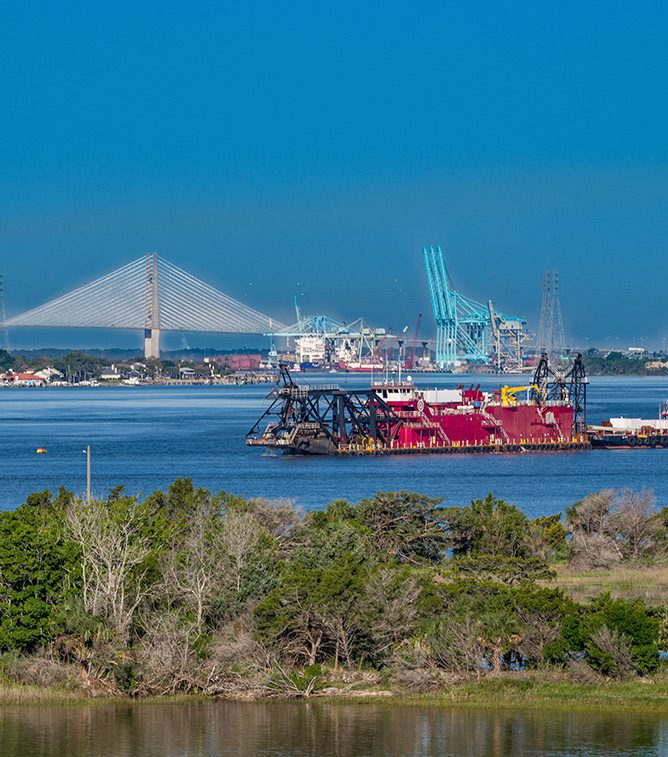Underwater Archaeology
Certified and Experienced Underwater Archaeology
Peace of mind with Chronicle Heritage underwater archaeology services.
From literature searches to underwater surveys, from site evaluations to cultural resource inventories, our work has taken us to the Atlantic, Gulf, and Pacific seaboards, the Great Lakes, the Caribbean, and beyond. We’ve supported dredging and harbor operations, offshore wind development, fiber optic cable route surveys, and much more.
Literature Searches
Chronicle Heritage has experts versed in maritime and nautical archaeology who can conduct literature searches of historical records and archival documents.
Not everything is online or in a digital database, and knowing where to look and which historical records to access helps us be efficient so you can get the answers you need about your site’s historical and cultural significance.
Underwater Surveys and Testing
Our team at Chronicle Heritage has the specialized technology and equipment, along with years of experience, in exploring and assessing underwater landscapes, structures, and artifacts to get you the information you need to plan your project.
Our underwater archaeology surveys systematically investigate and document underwater cultural heritage, including shipwrecks, submerged structures, and other items of historical or archaeological value. The collected data from the underwater survey gives you valuable insight into any mitigation measures your project might need to include.
Site Evaluation
Chronicle Heritage can conduct a site evaluation of your underwater project in order to gather detailed information, including the spatial layout, degree of preservation, and the nature of any submerged cultural resources.
Once we integrate the data from the site evaluation, we provide recommendations for the management of the site.
Site evaluation activities include:
- Desk-based assessment of historical records, archival documents, maps, and other sources to gather information about the site’s potential historical significance, cultural context, and any previous studies or surveys conducted in the area.
- A preliminary survey helps to identify any anomalies that may indicate the presence of an archaeological site.
- Our team knows when it is necessary to send divers on a reconnaissance dive to visually inspect the anomalies found in the survey.
- Site mapping and documentation includes documenting the location, dimensions, and orientation of any significant features, as well as recording the positions of artifacts and their relationship to the site.
- Artifact analysis is necessary to understanding the site’s chronology and cultural connections.
- An environmental assessment looks at factors like water quality, sediment composition, and current patterns in order to understand your site’s preservation state and any vulnerability.
After we find maritime artifacts, we begin the process of creating cultural resource inventories of the site that document and record everything we find.
Remote Sensing Surveys
Chronicle Heritage uses remote sensing surveys to identify cultural resources and prioritize sites for further investigation.
From side-scan sonar that creates detailed images of the seafloor to magnetometers that measure variations in the earth’s magnetic field to sub-bottom profiling, multi-beam echosounders and satellites, our team can examine large areas of the seafloor or water column efficiently and noninvasively to get you the information you need for your project.
Safety and Logistics
When it comes to safety at sea or underwater, our team at Chronicle Heritage can help you put the measures and protocols in place to protect the physical safety of anyone onsite. From dive safety to minimizing your impact on the environment, we can help.
We also have the expertise to streamline the myriad details involved with logistics in maritime archaeological sites, including the management of resources and equipment to, from, and at your project site. And, we can manage the permits and permissions required by the relevant authorities so that your site stays compliant.
Data Recovery
Data recovery is a meticulous and scientifically-rigorous process that we understand full well at Chronicle Heritage. We are passionate about stewarding our shared cultural resources because they remind us that we’re part of a much larger story.
If your project site does require excavation, we can manage the process from start to finish. The preliminary survey and site evaluation will help us plan how to prepare the site and execute the excavation. There are many underwater excavation techniques, and our team knows which to employ when. Our archaeologists know how to handle any artifacts that might be found. Once their significance has been determined, we work with you to develop a plan to keep your project moving forward in a way that also respects the cultural resource your project may have stumbled into.
Archaeological Collections Management Services
Chronicle Heritage’s archaeological collections management services encompass the organization, curation, and preservation of any archaeological materials recovered from an underwater site. We carefully document, catalog, and store any data recovered from a site.
Site Impact and Threat Assessments
Chronicle Heritage is able to identify and analyze the various factors that pose a risk to the preservation and integrity of submerged cultural heritage sites and artifacts.
The risks come from all directions: natural and environmental risks, human impacts, climate and sea level changes, and pollution. Knowing the nature of the natural and environmental factors will help to make better decisions and implement better management strategies to protect a site for future generations.
Cultural Resource and Heritage Management Solutions for Major Projects
Challenging projects enliven us – so bring us your project headache. We’ll partner with you all the way. And, we’ll start by bundling our services so you meet your milestones efficiently.
CSS Georgia, Savannah Harbor Expansion Archaeological Data Recovery and Mitigation
USACE, Savannah District, in partnership with the Georgia Ports Authority, is proposing to expand the Savannah Harbor navigation channel on the Savannah River. As designed, the Savannah Harbor Expansion Project (SHEP) will consist of deepening and widening various portions of the harbor.

Ask Chronicle Heritage
about the services we offer in your sector.
